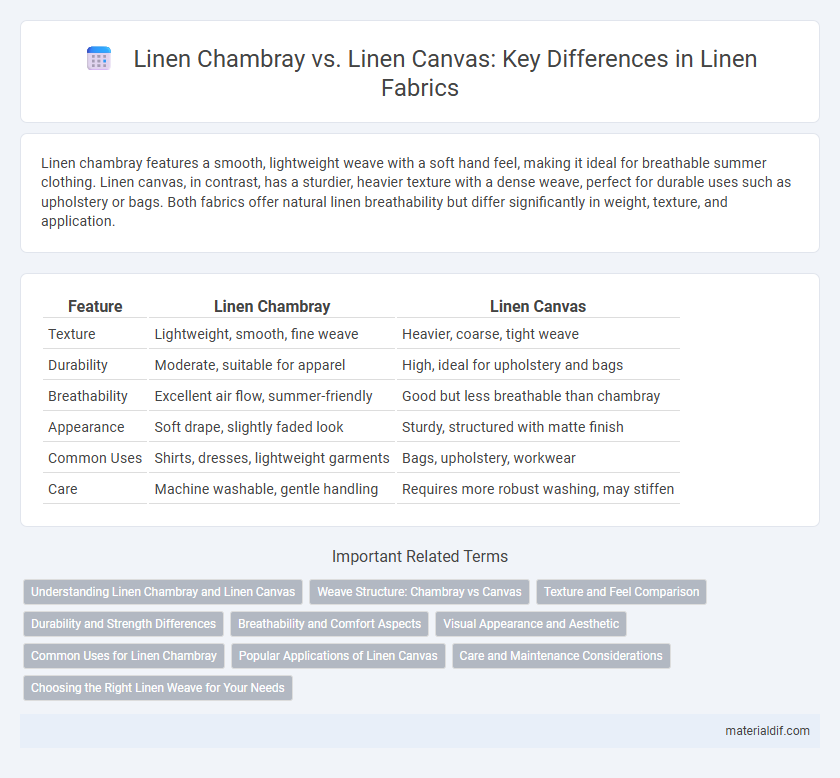Linen chambray features a smooth, lightweight weave with a soft hand feel, making it ideal for breathable summer clothing. Linen canvas, in contrast, has a sturdier, heavier texture with a dense weave, perfect for durable uses such as upholstery or bags. Both fabrics offer natural linen breathability but differ significantly in weight, texture, and application.
Table of Comparison
| Feature | Linen Chambray | Linen Canvas |
|---|---|---|
| Texture | Lightweight, smooth, fine weave | Heavier, coarse, tight weave |
| Durability | Moderate, suitable for apparel | High, ideal for upholstery and bags |
| Breathability | Excellent air flow, summer-friendly | Good but less breathable than chambray |
| Appearance | Soft drape, slightly faded look | Sturdy, structured with matte finish |
| Common Uses | Shirts, dresses, lightweight garments | Bags, upholstery, workwear |
| Care | Machine washable, gentle handling | Requires more robust washing, may stiffen |
Understanding Linen Chambray and Linen Canvas
Linen Chambray features a lightweight, plain weave with a soft texture, often combining dyed and undyed yarns to create a subtle heathered appearance ideal for breathable summer clothing. Linen Canvas is characterized by a heavier, tightly woven structure that offers durability and a coarse texture, commonly used in upholstery, bags, and outerwear for enhanced strength. Understanding these differences helps select the appropriate linen type based on fabric weight, weave density, and end-use requirements.
Weave Structure: Chambray vs Canvas
Linen chambray features a plain weave with a distinct colored warp and white weft, creating a lightweight fabric with a smooth texture and subtle sheen. Linen canvas employs a plain weave as well but is densely woven with thicker yarns, resulting in a heavy-duty, durable fabric with a rougher texture. The weave structure of chambray offers breathability and softness, while the tighter, sturdier canvas weave provides enhanced strength and resistance to wear.
Texture and Feel Comparison
Linen Chambray features a smooth, lightweight texture with a soft, breathable feel ideal for warm weather garments and casual wear. Linen Canvas boasts a heavier, more rigid texture with a durable, structured feel suited for upholstery, bags, and workwear. The distinct weave patterns contribute to Chambray's fine, almost denim-like appearance, while Canvas provides a coarse, sturdy surface.
Durability and Strength Differences
Linen Chambray features a lightweight, plain weave with a softer texture, making it ideal for breathable clothing but less durable under heavy wear. Linen Canvas is tightly woven with a thicker yarn, resulting in superior durability and strength, perfect for items requiring heavy-duty use such as bags and upholstery. The strength difference arises from the denser weave and heavier weight of Linen Canvas, providing enhanced resistance to tearing and abrasion compared to the more delicate Chambray.
Breathability and Comfort Aspects
Linen Chambray offers superior breathability due to its lightweight weave, allowing better air circulation which enhances comfort in warm weather. Linen Canvas features a denser weave that provides greater durability but slightly reduces airflow, making it less breathable compared to chambray. For maximum comfort during hot and humid conditions, Linen Chambray is the preferred choice, while Linen Canvas is ideal when durability is prioritized without significantly compromising breathability.
Visual Appearance and Aesthetic
Linen Chambray features a fine, smooth weave with a subtle sheen, creating a lightweight and breathable fabric that offers a soft, heathered appearance ideal for casual and elegant garments. In contrast, Linen Canvas has a coarser, denser texture with a matte finish, providing a sturdy and structured look often used in upholstery, bags, and durable clothing. The visual distinction lies in Chambray's delicate drape and light coloration versus Canvas's robust, textured surface and solid color depth.
Common Uses for Linen Chambray
Linen chambray is commonly used for lightweight clothing such as shirts, dresses, and blouses due to its soft texture and breathable qualities. Its fine weave and smooth finish make it ideal for casual wear and summer apparel that requires both comfort and style. Compared to linen canvas, which is heavier and more rigid, linen chambray suits garments that prioritize flexibility and drape.
Popular Applications of Linen Canvas
Linen canvas is widely favored for durable upholstery, tote bags, and artistic painting backdrops due to its heavyweight and robust texture. Unlike linen chambray, which suits lightweight apparel and casual shirts, linen canvas excels in applications requiring strength and structure. Its natural breathability and resistance to wear make linen canvas ideal for heavy-duty home decor and craft projects.
Care and Maintenance Considerations
Linen chambray requires gentle washing in cold water and low heat drying to prevent fading and maintain its lightweight, breathable texture. Linen canvas demands more robust care with minimal washing frequency to retain its durable, stiff structure, often benefiting from spot cleaning and air drying. Both fabrics benefit from ironing while slightly damp to smooth wrinkles without damaging fibers.
Choosing the Right Linen Weave for Your Needs
Linen chambray features a lightweight, plain-weave structure that offers a soft, breathable texture ideal for summer apparel and casual wear. Linen canvas is a heavier, tightly woven fabric known for its durability and stiffness, making it suitable for upholstery, bags, and outerwear. Selecting the right linen weave depends on whether you prioritize comfort and breathability or strength and longevity in your project.
Linen Chambray vs Linen Canvas Infographic

 materialdif.com
materialdif.com